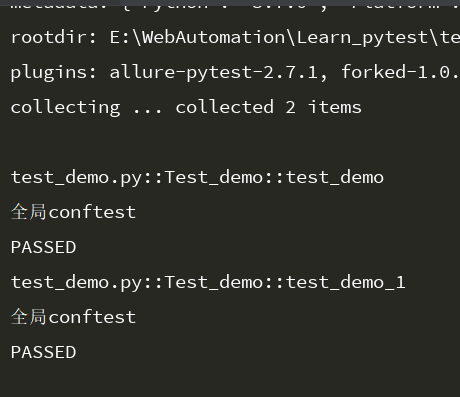1.目录结构
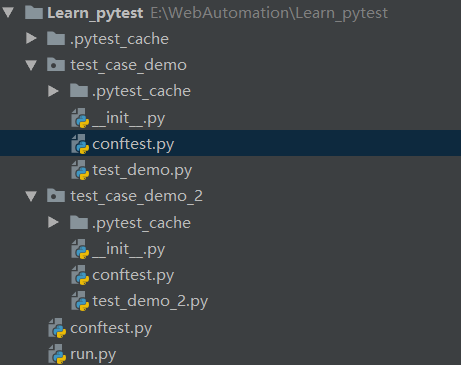
调用fixture有两种写法: 1.装饰器@pytest.mark.usefixtures("start") ; 2.直接在用例里面调用fixture装饰的方法当作参数输入def test_demo(self,start);3.设置fixture参数autouse=True
2.用例传fixture参数
1.项目跟目录下面的全局conftest.py
1 import pytest
2 @pytest.fixture()
3 def start():
4 print("\n全局conftest")
2.test_case_demo/conftest.py 和 test_demo.py
conftest.py 代码1 import pytest
2 @pytest.fixture()
3 def start_1():
4 print("\n局部test_case_demo")
test_demo.py 代码1 import pytest 2 class Test_demo(): 3 def test_demo(self,start,start_1): #标记代码 4 assert 1==1 5 6 if __name__ == '__main__': 7 pytest.main(["-s","-v","test_demo.py"])
运行结果:
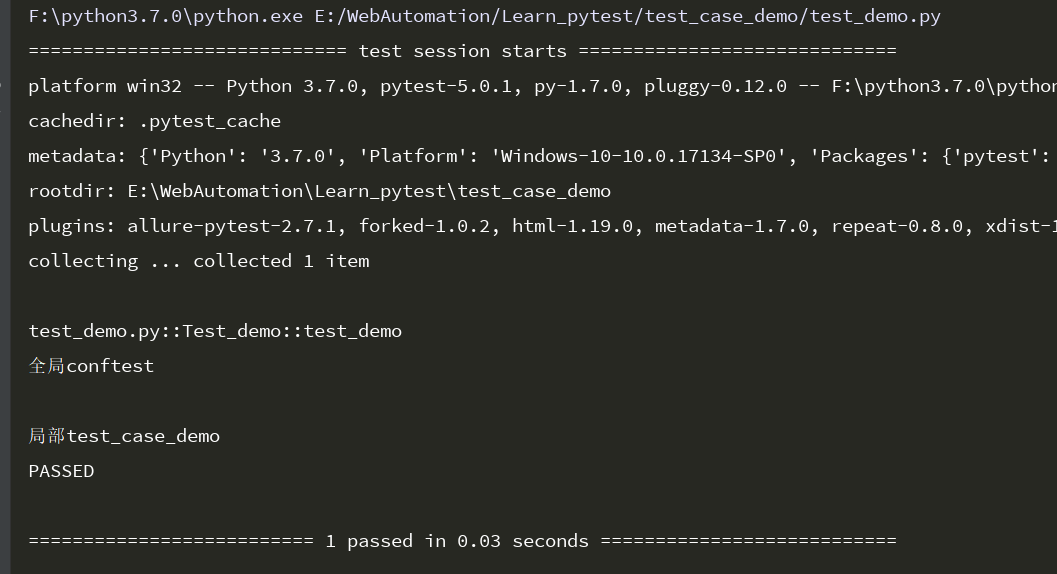
3.test_case_demo_2/conftest.py 和 test_demo_2.py
conftest.py 代码1 import pytest
2 @pytest.fixture()
3 def start_2():
4 print("\n局部test_case_demo_2")
test_demo_2.py 代码1 import pytest2 class Test_demo_2(): 3 def test_demo_2(self,start,start_1): #标记代码 4 assert 1==1 5 6 if __name__ == '__main__': 7 pytest.main(["-s","test_demo_2.py","-v"])
运行结果可以看出,start起到全局作用,test_case_demo目录下的start_1不管它的运行级别是什么,也只能在test_case_demo下面被调用。
test_demo_2用例不能跨模块调用test_case_demo模块下的start_1,所以test_demo_2用例会运行失败
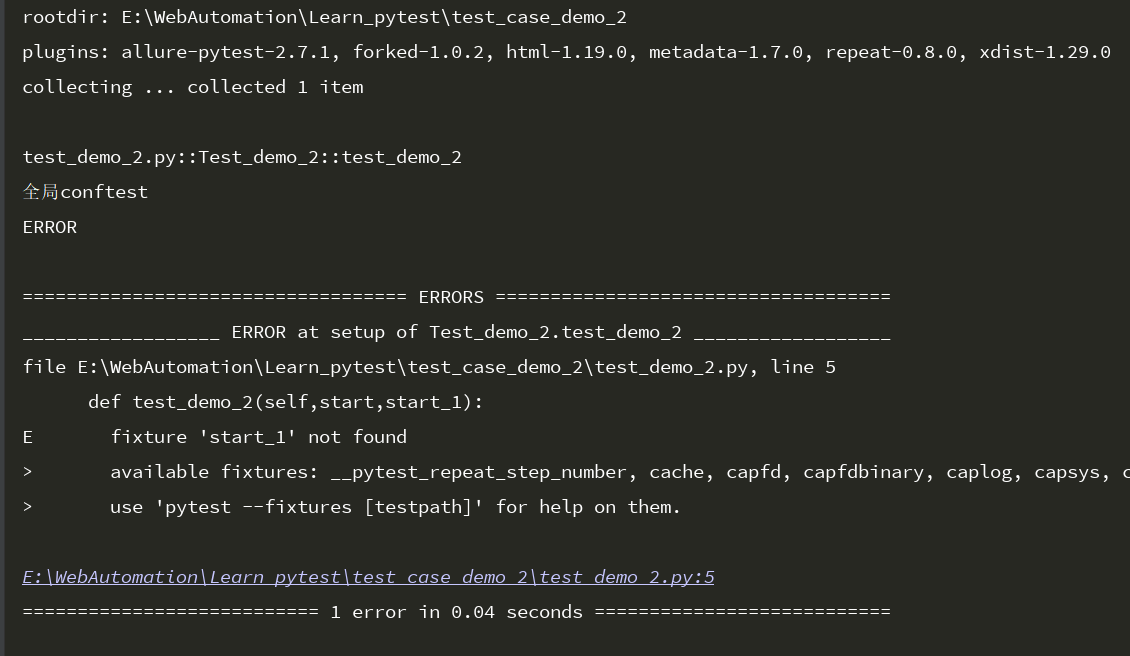
3.装饰器usefixtures
fixture有 function(默认选),class,module,session,四个级别
一.只有一个.py用例文件
1)定义为@pytest.fixture(scope="function")
跟目录下的conftest.py 代码1 import pytest
2 @pytest.fixture(scope="function")
3 def start():
4 print("\n全局conftest")
5
6 @pytest.fixture()
7 def iniv():
8 print("\n全局iniv")
test_demo.py 代码
1 import pytest
2 @pytest.mark.usefixtures("start") # 因为他们级别都是function,所以先运行iniv在运行start
3 @pytest.mark.usefixtures("iniv")
4 class Test_demo():
5 def test_demo(self):
6 assert 1==1
7 def test_demo_1(self):
8 assert 1==1
9
10 if __name__ == '__main__':
11 pytest.main(["-s","-v","test_demo.py"])
运行结果:start和iniv两个fixture都打印了
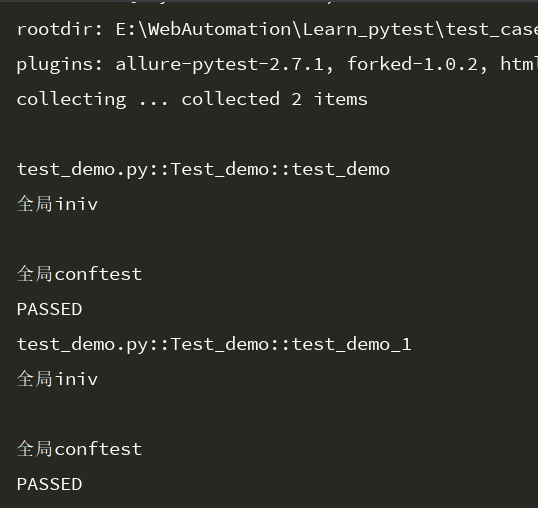
2)定义为@pytest.fixture(scope="class")
1 #跟目录下的conftest.py 代码
2 import pytest
3 @pytest.fixture(scope="class") #这个是装饰类
4 def start():
5 print("\n我是一个装饰class的start")
6
7 @pytest.fixture(scope="function") #这个是装饰用例
8 def iniv():
9 print("\n我是一个装饰function的iniv")
1 import pytest
2 @pytest.mark.usefixtures("start")
3 @pytest.mark.usefixtures("iniv")
4 class Test_demo():
5 def test_demo(self):
6 assert 1==1
7 def test_demo_1(self):
8 assert 1==1
9
10 if __name__ == '__main__':
11 pytest.main(["-s","-v","test_demo.py"])
运行结果:他会先运行start的在运行iniv的。因为start只是作用于class级别,而iniv是作用于function级别,所以start只需要执行一次,而iniv会有多少用例就运行多少次
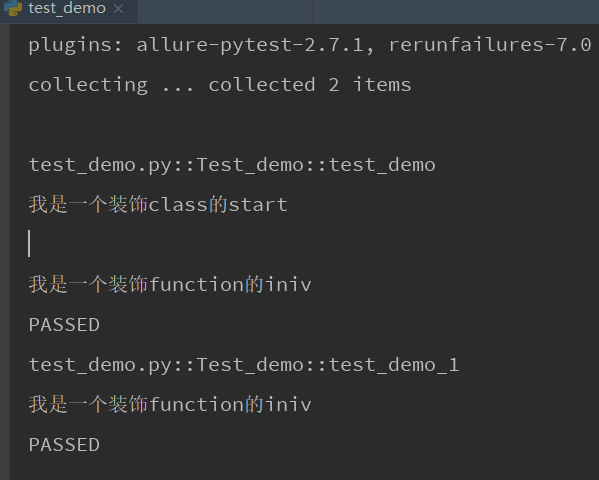
3)定义为@pytest.fixture(scope="module")
1 #跟目录下的conftest.py 代码
2 import pytest
3 @pytest.fixture(scope="module")
4 def start():
5 print("\n我是一个装饰module的start")
6
7 @pytest.fixture(scope="function")
8 def iniv():
9 print("\n我是一个装饰function的iniv")
1 #test_demo.py代码
2 import pytest
3 @pytest.mark.usefixtures("start")
4 @pytest.mark.usefixtures("iniv")
5 class Test_demo():
6 def test_demo(self):
7 assert 1==1
8 def test_demo_1(self):
9 assert 1==1
10 @pytest.mark.usefixtures("start")
11 @pytest.mark.usefixtures("iniv")
12 class Test_demo_1():
13 def test_demo(self):
14 assert 1==1
15 def test_demo_1(self):
16 assert 1==1
17
18 if __name__ == '__main__':
19 pytest.main(["-s","-v","test_demo.py"])
运行结果:他会先运行start的在运行iniv的。因为start只是作用于module级别,而iniv是作用于function级别,虽然我们在test_demo.py里面装饰了两次start,但是因为它是装饰模块的,并且也只有test_demo.py这个一个模块,所以start只需要执行一次,而iniv会有多少用例就运行多少次
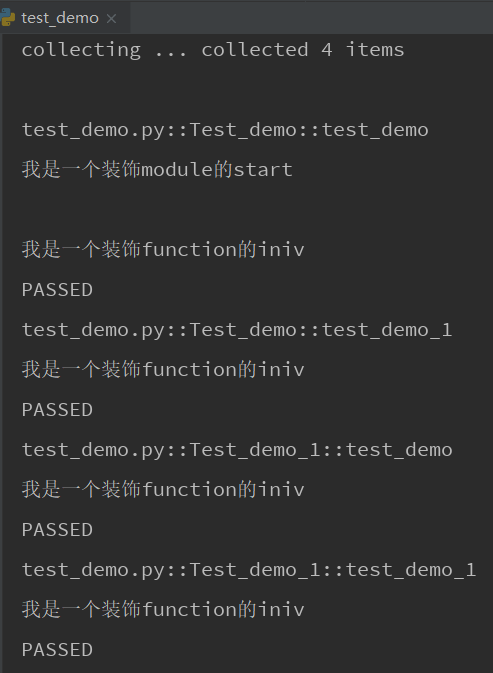
4)定义为@pytest.fixture(scope="session")
1 #跟目录下的conftest.py 代码
2 import pytest
3 @pytest.fixture(scope="session",autouse=True) #居然你是会话级别了,那么直接默认autouse=True就行了,不用调用就自动执行
4 def start():
5 print("\n我是一个装饰session的start")
6
7 @pytest.fixture(scope="function")
8 def iniv():
9 print("\n我是一个装饰function的iniv")
1 #test_demo.py代码
2 import pytest
3 @pytest.mark.usefixtures("iniv")
4 class Test_demo():
5 def test_demo(self):
6 assert 1==1
7 def test_demo_1(self):
8 assert 1==1
9
10 if __name__ == '__main__':
11 pytest.main(["-s","-v","test_demo.py"])
运行结果:他会先运行start的在运行iniv的。因为start只是作用于session级别,而iniv是作用于function级别,而且我们直接autouse=True,所以不用调用也会执行,而且start只需要执行一次,而iniv会有多少用例就运行多少次
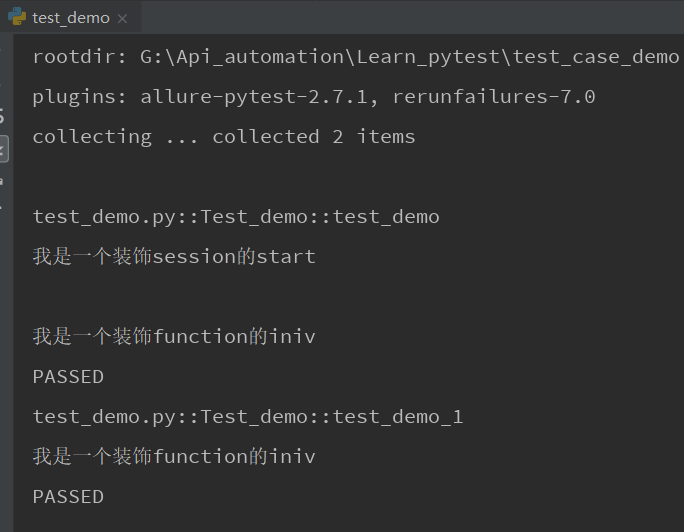
二.多个.py用例文件(这里不展示代码,自己去实践吧)
多个.py用例文件,其实运行结果:
1)function级别:有多少用例就运行多少次。
2)class级别:装饰多少个类上面的,那么一个就运行多少次,例如一个.py用例里面有两个类,都装饰了class级别的,那么就运行两次,如果有两个.py用例文件都有两个类,都装饰了class级别,那么就运行四次。
3)module级别:如果有一个.py用例文件,那么就运行一次module级别,如果有两个.py用例文件,那么就运行两次。
4)session级别:不管有多少个.py用例文件,始终就运行一次
3.设置autouse=True (这种不建议,因为你不调用它,它始终就会运行)
fixture默认autouse=False
跟目录下的conftest.py 代码
1 import pytest
2 @pytest.fixture(autouse=True) #启用
3 def start():
4 print("\n全局conftest")
5
6 @pytest.fixture(autouse=False) #不启用
7 def iniv():
8 print("\n全局iniv")
1 import pytest
2 #@pytest.mark.usefixtures("start") 这里注释掉了
3 class Test_demo():
4 def test_demo(self):
5 assert 1==1
6 def test_demo_1(self):
7 assert 1==1
8 if __name__ == '__main__':
9 pytest.main(["-s","-v","test_demo.py"])
运行结果:结果还是调用了start
